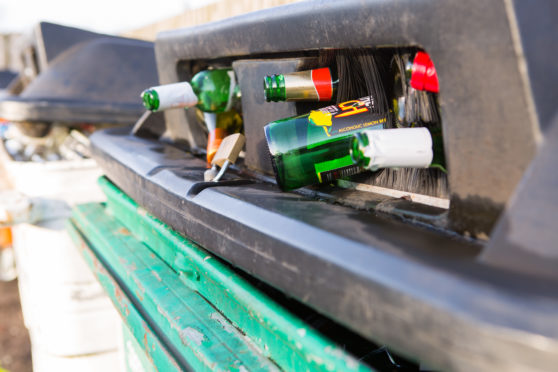The Scottish Government is set on continuing with a standard deposit return scheme price and the inclusion of glass, despite concerns raised from drinks-industry leaders.
Environment secretary Roseanna Cunningham said the rate had to appeal to consumers as an incentive to return their glass and plastic drinks containers during topical questions at Holyrood on Tuesday afternoon.
A “marathon” evidence session had taken place at the Scottish parliament with stakeholders from across the industry, with some business leaders pointing out a number of concerns about the government’s policy.
Companies including craft-beer makers Brewdog, soft-drink giants AG Barr and British Glass had all submitted evidence on the deposit return scheme ahead of Tuesday’s hearing.
If approved, the scheme would allow consumers to take single-use containers back to retailers covered by the programme and redeem a 20p deposit.
Similar schemes already exist in countries including Germany, Sweden and Norway.
Industry insiders warned almost two-thirds of the glass trade have concerns about including glass in the scheme. They also warned smaller retailers would be impacted to a greater extent because of the cost of storing glass returns.
One told The Courier following Tuesday’s evidence session they felt like they had not been listened too and one evidence session was not enough.
AG Barr – the makers of Irn Bru – noted their support for the deposit return scheme, but warned the introduction of glass adds a significant cost to retailers, requires those involved in the scheme to have more space for glass collection and has been abandoned in countries with successful deposit return schemes like Sweden and Norway.
Having a flat-rate of 20p for all containers has also been criticised, with beer makers Brewdog warning it could add up to £4.80 on to a pack of beer, compared with an additional 20p on to a bottle of high alcohol drink like whisky.
In a written submission, Brewdog said: “Uunder the scheme it seems a 24 pack of beer will cost an extra £4.80 at point of sale compared with only an additional 20p on a bottle of vodka or other spirits.
“This is likely to lead shoppers to choose hard liquor over lower ABV beer or other beverages.”
British Glass said including glass would significantly increase the operational cost of the scheme due to the material’s low value and greater weight.
Chief executive Dave Dalton said: “It will cause significant disruption to glass manufacturers, drinks companies, wholesalers, retailers, importers and the hospitality sector as well as increasing the cost of drinks in glass bottles for the people of Scotland.”
Environment secretary Ms Cunningham answered questions in the chamber on Tuesday from MSPs. She is expected to give evidence to the committee next week.
She said: “Scottish Government officials have met representatives of the Society of Independent Brewers—SIBA—and the Brewers Association of Scotland to discuss the deposit return scheme.
“SIBA also sits on working groups discussing producer and scheme administrator issues.
“If we introduce a scheme that excludes glass at the start, it is prohibitively expensive and it is almost impossible to retroactively add glass to the collection process.
“Plastics are easily understood and it is easy to change to a deposit return scheme on plastics. I accepted that there are slightly greater issues attached to glass, but it is also one of the most popular materials among the public to be included in this.
“Some 85% of people surveyed want glass to be included and one of the reasons for that, of course, is the very antisocial element that glass creates when it is left lying about.”
A Scottish Government spokesperson said: “A flat deposit keeps the system simple for consumers and our deposit rate is set to provide a strong incentive to return a wide range of containers.
“There is limited international evidence to suggest that consumer purchasing habits are likely to change significantly due to deposit return, and we are targeting a high return rate to minimise any potential effect.
“We are committed to continuing to work with industry to implement the scheme in the best way possible.”










